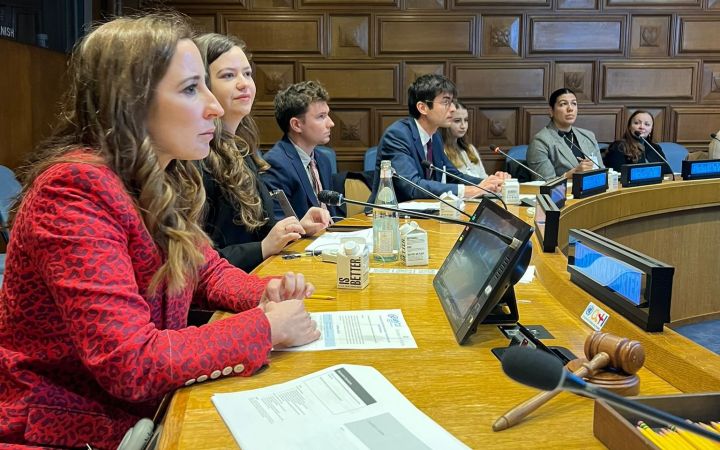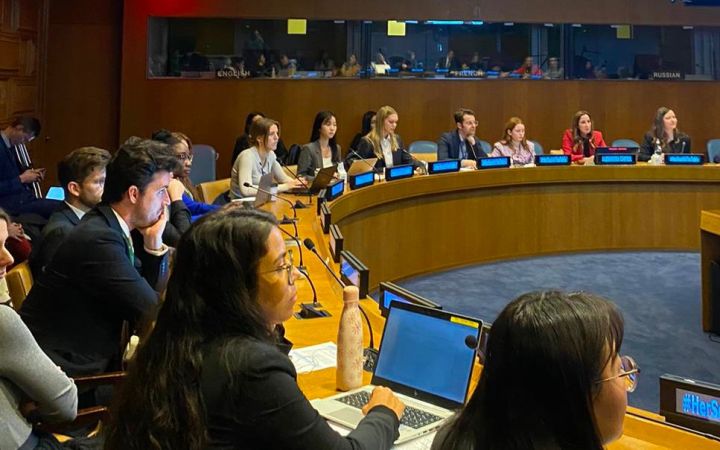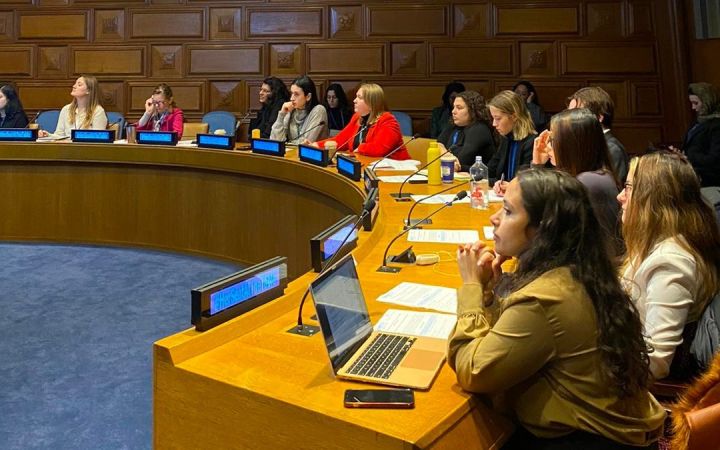New York, The United Nations Institute for Training and Research (UNITAR) New York Office (NYO) launched its second session with Columbia Law School on Gender Equality in Peacebuilding and Conflict Resolution which highlights the importance of the Sustainable Development Goal 5 (SDG 5), Gender Equality. Mr. Pelayo Alvarez opened the session by welcoming Professor Alex Carter and her Team from Columbia Law School as well as all the 110+ participants in-person and online.
Professor Carter started the session by emphasizing the importance of overcoming barriers to inclusive peace processes entails addressing several interconnected challenges. The paradox emerges when those engaged in conflict become the same individuals expected to advocate for peace, sidelining the voices of women and girls if not included from the outset. Decision-making in both war and peace often excludes women, contingent on conditional factors, while intersectionality adds layers of complexity. The internalization of patriarchal norms further impedes progress. To promote gender equity, recognizing and rectifying disparities faced by girls globally is paramount. Gender equity, rooted in the respect for all, necessitates equal access and treatment. Despite international endorsements such as the UN Convention on the Rights of the Child (CRC), disparities persist, with girls and women disproportionately targeted in over 3,200 political violence events in 2022. Achieving peace and gender equity demands a collective effort to surmount these obstacles and prioritize global inclusion and rights for women and girls.
Nathanael, a panelist from Columbia Law school Team then introduced the realm of women’s inclusion in peace processes, with seven distinct inclusion modalities that are identified across the stages of pre-negotiation, negotiations, and implementation. Modality 1 underscores the importance of direct representation at the negotiation table, either through integrating women within negotiation delegations or expanding their numbers, wherein women’s quotas may contribute to increased representation. Modality 2 explores the potential influence of observer status, where individuals, despite lacking an official role, exert impact through direct presence during negotiations, maintaining normative or political pressure on negotiating parties-a dynamic exemplified in the Liberia 2003 case study. Modality 3 delves into consultations, spanning officially endorsed, unofficial, and public types, offering diverse perspectives but potentially facing co-option by main negotiators, as observed in the Mexico 1994-2001 EZLN case study. Meanwhile, Modality 4 addresses inclusive commissions, including those for post-agreement tasks, and Modality 5 focuses on high-level problem-solving workshops organized by external entities to promote women, as seen in the DRC 2001-2003 case study. Modality 6 highlights public decision-making through mechanisms like national referendums in democracies, illustrated by the Northern Ireland 1996-1998 NIWC-Good Friday Agreement case study. Finally, Modality 7 explores mass action, involving public demonstrations to pressure conflicting parties into initiating negotiations and signing peace agreements, as demonstrated in the Tunisia 2013-2015 case study.
In the context of revisiting UN SDG 5, the primary focus lies on direct representation within the formal negotiation process. Understanding the distinction between track one diplomacy (formal negotiation) and track two diplomacy (unofficial or back channel processes, offering an opportunity to build trust) is pivotal in comprehending the dynamics of these inclusion modalities in peace processes. Each modality presents its own set of challenges and opportunities, contributing to a nuanced approach to women’s participation and influence at different stages of peacebuilding.
Professor Alex Carter then proceeded to present that meaningful inclusion in peace-building processes, the United Nations (UN) and other organizations can take strategic steps. Aligning with UN Sustainable Development Goal 5, integrating gender mainstreaming in government and early education is crucial for the organic inclusion of women’s rights. Assessing power positions at all management levels is imperative to ensure genuine representation, recognizing that a mere numerical balance, such as 50%, may not translate into equitable distribution in higher power positions. Addressing the gender data gap is essential to ascertain that participants feel their suggestions contribute, necessitating a comprehensive approach to gather, analyze, and act upon gender-disaggregated data. Empowering women through funding and policy-making is instrumental in dismantling barriers to their participation, creating an enabling environment for meaningful engagement in decision-making.
The session ended with the success of inclusive peace-building hinges on a multifaceted approach that transcends numerical quotas. It requires a cultural shift through gender mainstreaming, an understanding of power dynamics, bridging the gender data gap, and active empowerment through policies and funding. Moreover, the active involvement of women’s rights organizations ensures that diverse perspectives shape peace-building efforts. By embracing these measures, the UN and other organizations can catalyze a transformative process, fostering inclusivity and equality in peace-building processes, and contributing to more robust and sustainable outcomes.











